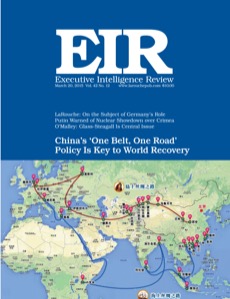On the Subject of Germany’s Role
by Lyndon H. LaRouche, Jr.
“The commendable contribution expressed in the speech by Germany’s Foreign Minister Frank-Walter Steinmeier delivered on March 12, 2015, nonetheless fails to meet the essential features of the actually required terms. I, therefore, present the case required, as follows henceforth.
“In fact, the present conditions of the inhabited planet Earth, have reached the point at which the notion of the habitation of the planet, in its entirety, must be responsive to the principles of Johannes Kepler, which must be considered, actually universally, as the proper notion of design for the organization of the entirety of the planet....”
Germans Raise the Alarm: Putin Warned West of Nuclear Showdown over Crimea
by Jeffrey Steinberg
Steinmeier Takes On the U.S. War Party
by William Jones
Beyond Attack on Venezuela: Global Assault on the BRICS
by Cynthia R. Rush
Modi Strengthens India’s Ties with Its Indian Ocean Neighbors
by Ramtanu Maitra
International Intelligence
Feature
China’s Congress Charts a New Path for the World
by William Jones
Much of the attention focused on this year’s meeting of China’s National People’s Congress and the Chinese People’s Political Consultative Committee, has been misguided or worse, malicious. But the Congress’s importance is real. With the full brunt of the international financial crisis hitting the West, China is playing a crucial role in maintaining stability in the world economy. In particular, its commitment to the development of the two Silk Roads, the Silk Road Economic Belt and the 21st Century Maritime Silk Road, represents the only option for the world to chart a path out of the present economic crisis.
The Maritime Silk Road—1405 and 2013
by Michael Billington
The old, caravan Silk Road through Central Asia, dating back to Roman times, is well known. Less well known is the precedent for the New Maritime Silk Road—the massive armadas of the Ming Dynasty of China in the early 15th Century, by far the largest and most extensive voyages of diplomacy and exploration in the world at that time.
China’s ‘One Belt/One Road’ Policy Is Open to All Nations
by a Chinese expert
A highly-placed Chinese expert spoke at the EIR/Schiller Institute diplomatic seminar in Copenhagen on Jan. 30.
Economics
Greece Is Taking Up the BRICS Option
by Dean Andromidas
Greece has become the standard bearer for the BRICS in Europe. With the European Union refusing to turn off the road leading to self-destruction, the drive for economic development led by Brazil, Russia, India, China, and South Africa is creating a powerful alternative that Greece is ready to adopt.
IMF Applies ‘Greek’ Austerity Formula to War-Ravaged Ukraine
by Susan Welsh
The agreement signed between the IMF and the Ukrainian government on March 11 will do nothing to help that bankrupt and war-torn country. On the contrary, it will drive Ukraine deeper into debt, and force wages and living standards down even further than has already occurred under the regime put into place by the U.S. and the EU one year ago.
Ending the Myth of the U.S. ‘Recovery’
by Paul Gallagher
The approach of the 2016 Presidential election has galvanized some among leading Democrats to reject, publicly, the idea that Americans have experienced any “recovery” from the 2007-08 collapse. The reality of the lack of capital investment since the elimination of the Glass-Steagall Act is asserting itself.
National
Martin O’Malley: Restoring Glass-Steagall Is the Central Issue
by Debra Hanania Freeman
Former Maryland Gov. Martin O’Malley, who has been touring the country pressing his exploratory bid for the 2016 Democratic Presidential nomination, has made restoring Glass-Steagall central to addressing what he sees as the defining issues of income inequality and continually declining wages.
LaRouche: O’Malley Is Right About Glass-Steagall
Fraud, Drugs, Terror: Will HSBC Be Stopped?
For more than a century, HSBC’s financial skullduggery has helped cover over the problems of its patrons, filling its coffers with ill-gotten gains from drugs, arms sales, and financial manipulation. But now, HSBC has run into some serious problems, which threaten to pull down both the bank itself, and some of its most prominent protectors.
Science
To Explain the Solar System, First Understand Creativity
The second part of the Feb. 25 LaRouche PAC Science Team’s New Paradigm weekly show, this week featuring Benjamin Deniston, joined by Megan Beets and Jason Ross, continuing an ongoing discussion about the continuity of thought from Nicholas of Cusa to Johannes Kepler. This week the discussion focuses on Kepler’s exploration of the relationship between the musical harmonies and the orbits of the five inner planets.
Editorial
Three Leaders Offer Hope Against War



